- Home
- Mack Reynolds
Deathwish World Page 12
Deathwish World Read online
Page 12
Frank said, “You’ve suggested that you took on other contracts besides wars and revolutions.”
Panikkar nodded. “Yes, many. Last month we conducted a commando action which involved only twenty men. One of our best officers, a Major Shannon, and nineteen veteran non-coms. It seems that there was a half-mad dictator on one of the smaller Caribbean islands. His people overwhelmingly wished to join the United States but he, understandably, refused. He and his family were vampires upon that island’s population. However, funds were raised, and the commando detachment was sent to take him out.”
“Then you actually do individual assassinations.”
The Aussie chuckled again but stuck to his drink, rather than joining into the conversation.
The colonel shrugged. “On occasion. We see little difference, morally speaking, between entering into a full-fledged war or killing an individual. But see here, you are an educated young man. You must have read of Genghis Khan, one of the great military men of all time. He rose from being a simple chieftain of a small nomadic tribe in Central Asia to conquer the largest empire the world had ever seen. He destroyed whole civilizations. He slaughtered millions of sedentary peoples so their lands could be devoted to his flocks. Only one thing stopped his hordes from engulfing Europe: he died. Now, tell me, my good Frank, what would the world have been saved had our Genghis Khan been assassinated when he was a young man?”
Frank was nonplussed.
The Indian went on. “It goes both ways. Suppose your Abraham Lincoln had been suitably guarded against assassination. What would have been the difference if this good man had lived on to preside over the reconstruction of your South? It took a hundred years for the South to fully recover from your Civil War.”
Frank said hesitantly, “Your Graf provides bodyguards, I take it.”
“Naturally. He has the most efficient bodyguards in the world.”
“I hope so. Assassination is—well, hell, it isn’t civilized!”
“But it can improve civilization.” Panikkar finished his second large whiskey. “Take Mahem Dhu, who recently proclaimed himself the Mahdi in Central Africa.”
“Never heard of him.”
“The Mahdi is a figure of Moslem mythology,” Panikkar explained. “Something like a messiah, he is to return as the world is about to end, unite all believers, and destroy those who are evil. It is a most primitive aspect of Islam. The last major leader who proclaimed himself the Mahdi was Mohammed Ahmed in the Anglo-Egyptian Sudan in the 19th Century. He called for a holy war and in a few years his followers overwhelmed an area half the size of Europe, slaughtering hundreds of thousands. They beat the British army and killed General Gordon.”
“But this new one?” Frank said.
“Mahem Dhu. He’s trying the same thing in Central and Northern Africa. He refuses to join the United Church, while many Islamic sects are joining. If he continues, millions of uneducated blacks and Arabs will die. If he should be, ah, removed, their lives will be spared and, with the help of United Church missionaries, their countries will be rapidly upgraded.”
“I see your point,” Frank admitted. He pulled at his drink unhappily. “Still…”
Nat Fraser scoffed. “Mate,” he said. “You bloody well told me that the Yanks deported you for homicide. What’s the buggering difference? You knock off some cove on your own, or you do it for the Graf for mucking good pay. And you don’t have to take a contract if you don’t like it. Strewth, I’ve turned down more than one.”
Frank looked back at the colonel. “I don’t see what use I’d be to you. I’m no soldier.”
Ram Panikkar shrugged it off. “It’s not important, Frank. Sleep on it. We might find you a position appropriate to your abilities, seeing that you’re a most personable and a reasonably educated young man.” He looked at his wrist chronometer. “But you must be tired after all your troubles today. And you must be hungry.” He looked at the Australian. “Nat, I suggest that you see that Frank gets a good meal and then put him up for the night in one of the dormitories. I’d suggest the non-com quarters. Tomorrow morning he can return to his hotel.”
“Too right, Colonel,” Nat said, coming to his feet.
Frank stood too and began his thanks but the colonel waved them aside, smiling, and returned to the papers on his desk without further words.
* * * *
Next morning, driven to his hotel by Nat Fraser, Frank found not only his suitcases and the personal things that had been stolen from him by the muggers, but a pile of Swiss francs and Moroccan dirhams atop the rickety dresser. They totaled a full equivalent of a thousand pseudodollars, slightly more than he had been robbed of. After all, he had owed the cab driver five dirhams and had paid Luigi ten dirhams for room rent, and had bought a round of drinks at Paul’s Bar. Even his camera was in one of the suitcases. The colonel had clout.
A vague thought came to him. How had Panikkar known he was staying at the Hotel Rome? He had told neither the Indian nor Nat Fraser.
Chapter Nine: Roy Cos
The shuttle from Nassau to Greater Miami was brief and uneventful. Both men were so deep in their thoughts that Roy Cos didn’t even bother to stare out the heavy glass ports at the sea and islets below. Obviously, he was having second thoughts about this whole project. How had he ever allowed the damned newsman to talk him into it?
Forry Brown squinted over at him and tried to rise to the occasion. He knew very well what was in Roy’s mind; he even had a twinge of guilt about it. But, the whole thing was now irreversible. He said, “You know the trouble with you Utopians?”
Roy sighed and said, “No.”
“You won’t like Utopia.”
Roy sighed again and said, “There is no such thing as Utopia. As soon as you get to your goal, there’s a better one beckoning. No science is more in a condition of continual change than socioeconomics. Utopian? Our revolutionary forefathers in 1776 thought they were creating a Utopia. They didn’t.”
“Fine,” Forry said. “But whatever you call it, most of you won’t like it.”
“Why?”
“Because you all have a different picture of it. Vegetarians will picture the future society as one in which no meat will be eaten. Prohibitionists expect the end of booze but a good Italian radical would be aghast at the idea that wine and good food, including meat, would be taboo. Nudists expect nudism, puritans expect purity—in petticoats, at that. Serious straight-laced Wobblies expect the world of the future to be very serious and very efficient, but the easygoing ones look forward to a frivolous, bang-up time for everybody. And the differences on the sex question are going to be wild! I’ll bet the march toward complete promiscuity will continue but I’ve noted that most of the Wobblies I’ve met are on the conservative side.”
Roy sighed once again and shifted uncomfortably in his seat. “Wobblies don’t believe that establishing our social system will solve all problems. We only contend that it will solve a good many of the most pressing problems.”
Forry grunted and rubbed along his wisp of a mustache with a thumbnail. “I wish I could smoke in this flying sardine can,” he said. “What the hell ever happened to socialism? I don’t believe I’ve even heard the word for years.”
“Scientific socialism stopped being scientific about a century and a half ago,” Roy told him. “It got to the point where everybody was called socialist, from Roosevelt to Hitler. Sweden was socialist. So was Russia, not to speak of England, which still had a royal family left over from feudalism. It stopped making sense. The only group in the States that would have been called socialists are the Libertarians.”
“What do they want, as compared to you Wobblies?”
“To reform People’s Capitalism, or Meritocracy. We want to end it and establish a new system. They want more GAS for everybody, better education, better everything. They’re reformers, not revolutionaries.” He looked out the small porthole. “Hey, we’re coming in.” Then, in a lower voice: “Did you notice that the man who was f
ollowing us is on our shuttle?”
“I noticed.”
They walked down the shuttle’s ladder, their small luggage in hand, and headed for the customs hall. Customs was the merest of formalities; the twelve packs of illegal cigarettes went through unseen.
Passed by customs, they headed for the exit and were immediately accosted by two young men, one in prole garments, the other in a fairly presentable sportsman’s garb. The prole was big and square and on the rugged side, the other was trimmer. Both were in their early twenties and both wore grim expressions.
Forry looked at them warily but Roy said, smiling and extending his hand, “Hi, Ron. Hi, Les. I knew you’d make it.” As usual, a smile worked wonders on the face of the Wobbly organizer. “Forry, these are the Wobblies I told you about. Ronald Ellison, Lester Bates, meet Forrest Brown.”
Forry nodded as he shook. “Glad to see you fellas. We’re being followed.”
“I spotted him,” the husky youth, Ron, said. “I thought this contract thing didn’t start until tomorrow morning.”
Forry said, “It starts at midnight. But meanwhile they’ll be wanting to know where Roy is going, where he’ll be when the contract does go into effect. Did you get a car?”
Les, the better dressed one, nodded. “Right.”
They left the administrative building and started out into the large parking area.
“Where’s the car?” Forry said.
“Not in the parking lot,” Ron told him. “We thought there might be somebody waiting for you to land. Just follow me.”
Mystified, Roy and Forry let the other two lead the way. They walked to the far end of the shuttleport’s administration building, then entered a narrow alley between it and a huge hangar. The drab narrowness gave the passage a sinister quality.
The little ex-newsman said in protest, “What the hell?” He looked at their two guides suspiciously and then at Roy.
Roy said, “It’s all right. If they say it’s okay, then it is. Lead on, Les.”
They hadn’t gone fifty feet down the deserted alley before two others entered it. One of them was the unknown who had tailed them from the time they had left the offices of Oliver Brett-James in Nassau. The other was a stranger. They were pretending to be in deep discussion, as if unaware of the four ahead of them in the narrow alleyway.
Les, Ron, Roy, and Forry continued on their course, the newsman nervous about their followers.
And then two more huskies entered the alley behind those followers.
Ron said, with grim satisfaction, “Here we go.” He and Les turned and watched expectantly as though ready to return.
The need didn’t materialize. The action that took place was brutal and brief. One of the new arrivals had a short truncheon in his right hand; the other seemed to have something metallic over the knuckles of his right fist. With no preliminaries whatever, they attacked. In fifteen seconds, the two who had been following Roy Cos were down on the alley floor, arms over their heads in a futile attempt to protect themselves. The newcomers lashed into them with heavy shoes, kicking at ribs, stomachs, and kidneys.
“Jesus,” Ron said in admiration. “If Billy doesn’t look out he’s going to kill those funkers.”
“Couldn’t happen to nicer guys,” Les growled.
Forry looked over at Roy Cos. “You are an organizer,” he said in awe.
Roy said, “I have my moments.”
Leaving their unconscious victims behind, the two additional guards came up, grinning as though embarrassed.
The first one said, “If either of those bastards are out of the hospital in less than two weeks, I’ll turn in my merit badge in mugging.”
Roy said, “Forrest Brown, meet Richard Samuelson and Billy Tucker.”
Forry said, even as he shook, “You gentlemen take your work seriously, don’t you?”
Dick Samuelson and Billy Tucker were in the same age group as Ron and Les, both six-footers, both around two hundred pounds. They greeted Roy Cos warmly after they shook hands with the little newsman.
“Holy smog,” Forry muttered. “If all you Wobblies are like this, why didn’t you put over your damned revolution years ago? Let’s get out of here before somebody else shows up.”
The six of them hurried on up the alley.
“Glad I made it in time,” Billy said. “I had to come all the way from Denver. Had a meet there.”
Forry looked at him. “What kind of a meet?”
“Wrestling.”
The alley debouched on a small parking area. For all but a few, private cars were a luxury.
They came up to the limousine Ron indicated, and Forry began to get into the driver’s seat, saying, “I’m the only one who knows where we’re going to ground.”
But Roy shook his head. “Les is a racing driver,” he said simply.
The ex-newsman looked at Les Bates thoughtfully and then nodded. “Fine,” he said, getting into the back seat instead. “Get out on the highway and turn right, Les.” He said to Billy, “I saw you give those two characters in the alley a quick frisk after they passed out. Did you get anything?”
“A shooter,” Billy said, satisfaction in his voice.
“Well, as soon as we get out into the countryside, you ought to ditch it. We can’t afford to be found by the police with an unlicensed gun. If they coop Roy up in some banger, the Grafs men will figure out how to get to him within hours. If any of the rest of your boys are heeled, think about that.”
They looked at him respectfully even as Les, obviously expert at the wheel, took them out onto the highway. Dick Samuelson said, “Yes, sir,” meek as a mouse, and brought out a compact black automatic, holding it in a gloved hand to be tossed out a window.
Billy dipped his hand into the side pocket of his prole denim jacket reluctantly and came out with a Gyrojet pistol. “It’s a beauty,” he said with regret. “Whoever those cloddies were, they didn’t skimp on equipment.”
“They’re probably employees of the Graf,” Forry said sourly.
Dick Samuelson hissed between his teeth. “Then Roy wasn’t just whistlin’ Dixie when he said that most likely we’d be in thick soup, eh? I’ve heard about the Graf.”
Ron said, “There’s a car behind. I think it’s a tail.”
Les grinned gently and snicked his gear selector. “I picked out this pile of iron myself,” he said. “Belt up, boys.”
Billy said to Forry, “You still think we ought to toss these shooters out?”
“Absolutely,” the newsman said. “The first time we turn a corner, so they can’t see you do it. For all we know, they’re police. We don’t want to take on a carload of fuzzies.”
“Okay,” Billy said. “Get our asses out of here, Les. Graf’s men or fuzzies, they’re sure to be heeled.”
Shaking their pursuers was child’s play for Lester Bates. He was not only a racing driver but a very smooth one, powering through the apex of every turn, using every inch of the road.
It was only after there could be no doubt that they had lost their pursuers that Les turned to Forry. “Where do you want to go?”
Forry gave directions and then, after a time, said, “That tavern, there. Pull in behind it.”
Roy looked at him. “You don’t mean we’re hiding out in a roadside bar?”
The little man grunted amusement. “Hardly. That’s just where we drop this car. You know what’s happened by this time? Whoever was following us has noted our license number and relayed it to either the police or some of their own organization. So we switch. I have a car stashed here; the owner’s an old drinking buddy who can keep his mouth shut.”
Dick Samuelson looked over at him as they pulled into the parking area. “Even if the Graf’s hit men are working him over?”
“No, not then,” Forry admitted, drawing deeply on his cigarette. “But Ted doesn’t know enough to tell them anything. His instructions are to give them the truth. We left a hovercar here and later picked it up, leaving this one in its place.”<
br />
They pulled up beside the vehicle he indicated. Les looked at it questioningly. He said, “It has no license plates. That’ll make it conspicuous.”
Forry nodded. “On purpose. Ted couldn’t tell anybody what the numbers were, even if he wanted to. We’ll put the plates on shortly, down the road a bit.”
Continually checking to see whether they had picked up new pursuers, they finally made it to their destination. It was an old house on the beach to the south of Miami, fairly well isolated. Undoubtedly, it had once been the winter home of a wealthy northerner. Forry had Les Bates back the car into the garage, so that it would be hidden from view but poised for escape.
The six of them went into the rambling one-story villa. Forry led the way to the living room. Roy looked about him. “How’d you manage this?”
Forry said, “I rented it for a week, using my international credit card. I’ve got a few thousand saved up. We won’t use your million a day until after we’ve made our initial play. We don’t want them to zero in on us at this stage.”
They all found seats in comfort chairs or on couches. Ron said, on edge, “What happens now?”
Forry said, “In a minute, one of you go up to the sundeck on the roof as a sentry. But I want to talk to you first, before the others get here.”
“What others?” Roy said.
“You’ll see,” Forry told him. He looked around at Ron, Les, Dick, and Billy, ran his tongue thoughtfully over his gray lower lip, and said, “The question becomes, how do Roy and I know we can trust you? I think his idea of getting Wobbly members to act as his bodyguard, rather than professionals, was a good one. In the past, Deathwish Policyholders have hired professionals. Often they wound up getting hit by their own guards, who were either bribed by the Graf’s men, or were already on his payroll. No offense intended, but how can we know that one of you can’t be gotten to, if the bribe’s big enough?”

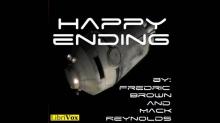 Happy Ending
Happy Ending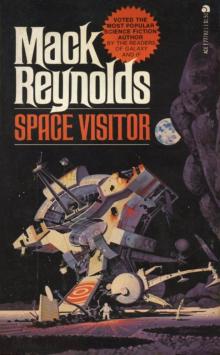 Space Visitor
Space Visitor A Kiss Before Loving
A Kiss Before Loving Episode on the Riviera
Episode on the Riviera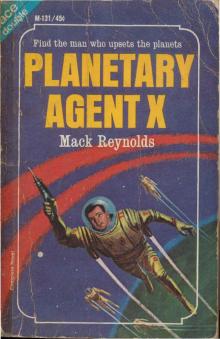 Planetary Agent X
Planetary Agent X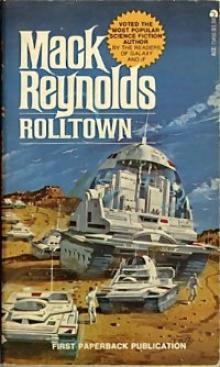 Rolltown bh-3
Rolltown bh-3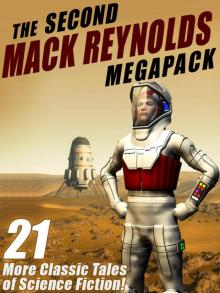 The Second Mack Reynolds Megapack
The Second Mack Reynolds Megapack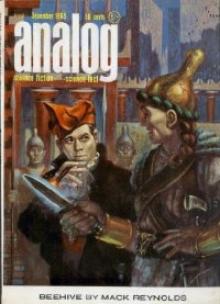 Dawnman Planet up-2
Dawnman Planet up-2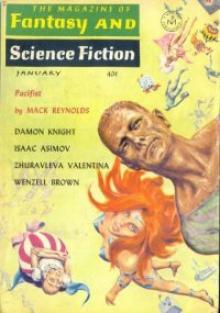 Pacifist
Pacifist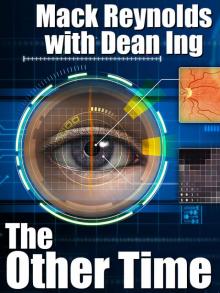 The Other Time
The Other Time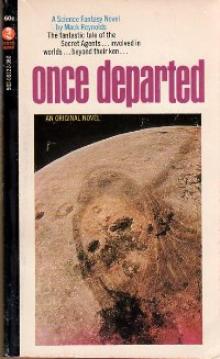 Once Departed
Once Departed IQ
IQ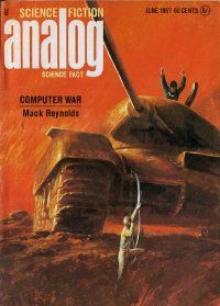 Computer War
Computer War Earth Unaware
Earth Unaware The Rival Rigelians up-3
The Rival Rigelians up-3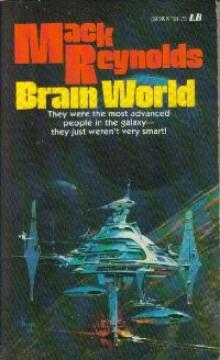 Brain World up-7
Brain World up-7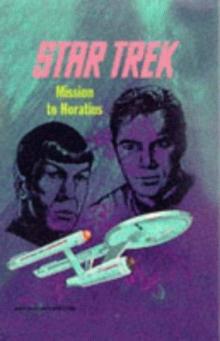 Star Trek - TOS - Mission to Horatius
Star Trek - TOS - Mission to Horatius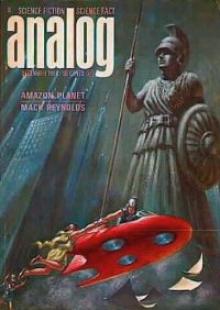 Amazon Planet up-5
Amazon Planet up-5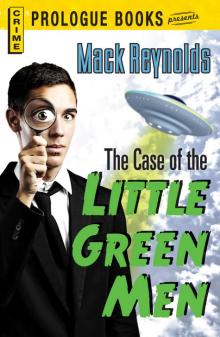 The Case of the Little Green Men
The Case of the Little Green Men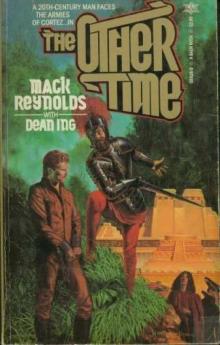 Other Time
Other Time The Mack Reynolds Megapack
The Mack Reynolds Megapack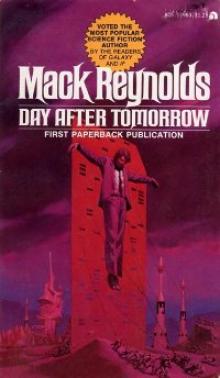 Day After Tomorrow
Day After Tomorrow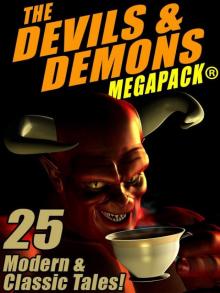 The Devils & Demons MEGAPACK ®: 25 Modern and Classic Tales
The Devils & Demons MEGAPACK ®: 25 Modern and Classic Tales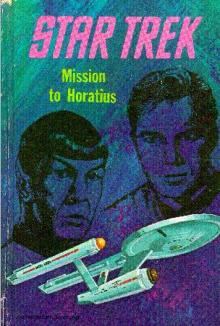 Mission to Horatius
Mission to Horatius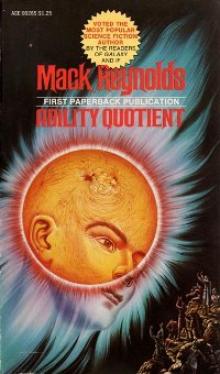 Ability Quotient
Ability Quotient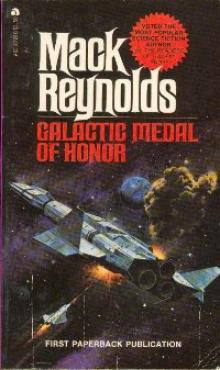 Galactic Medal of Honor
Galactic Medal of Honor Trojan Orbit
Trojan Orbit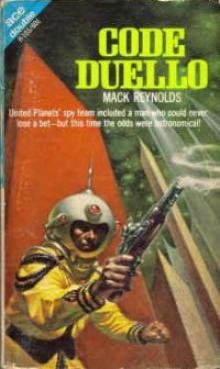 Code Duello up-4
Code Duello up-4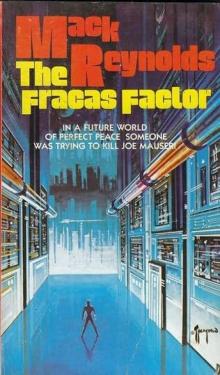 The Fracas Factor
The Fracas Factor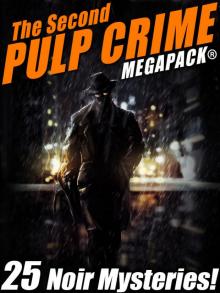 The Second Pulp Crime
The Second Pulp Crime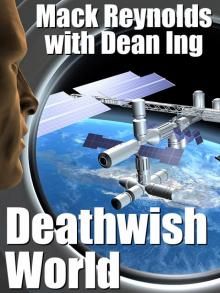 Deathwish World
Deathwish World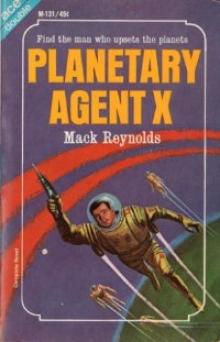 Planetary Agent X up-1
Planetary Agent X up-1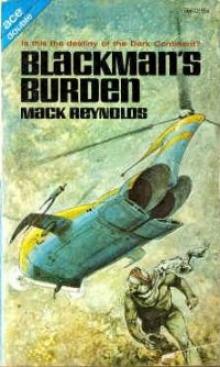 Blackman' Burden na-1
Blackman' Burden na-1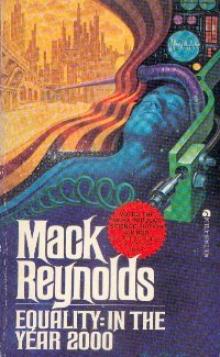 Equality: In the Year 2000 jw-2
Equality: In the Year 2000 jw-2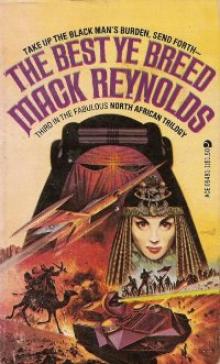 The Best Ye Breed na-3
The Best Ye Breed na-3 The Jet Set
The Jet Set The Rival Rigelians
The Rival Rigelians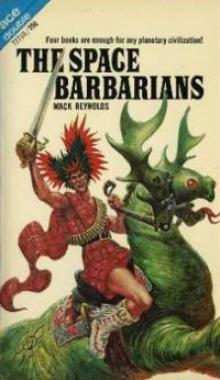 The Space Barbarians
The Space Barbarians